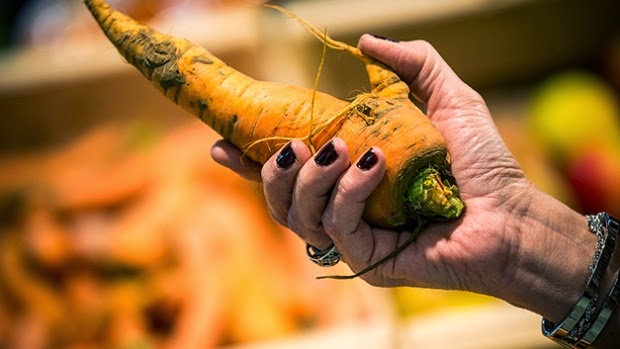(W)right on…
Waste not, want not
It’s astonishing and rather disgusting that $31 billion in
food is wasted annually in Canada – or 40% of the food we produce.
The alarming statistic speaks directly to the amount of food
that’s left to rot or spoil in our refrigerators, the food left uneaten at
kitchen and restaurant tables, and the truckloads of food never considered or
offered for public consumption because that food is not considered to be
attractive.Forget about toddlers and other young children who are called picky eaters. It looks as though we’ve become a nation of picky eaters.
 |
| An ugly carrot? |
The issue of food waste was again raised recently when
Loblaws announced it wants to sell “ugly” produce in its Ontario and Quebec
stores. The produce – apples, potatoes and other goods that appear to be
imperfect (imperfect, only because they are judged by their appearance, not
their quality of substance) – will be sold at discount as part of the food
company’s new line of no-name brand produce.
Loblaws deserves credit for offering to the public food that
in the past was difficult to sell. The discount – of up to 30%, according to
reports – will give customers reason to pause and consider the value of the
food they’re purchasing, even if that food doesn’t look like the fresh fruit
and vegetables we’ve been conditioned to believe are attractive and therefore
acceptable.
If the gambit pays off (and it likely will, especially if
other grocery stores begin to offer the same), the idea of purchasing such goods
could have an impact on Canada’s food efficiency. Billions of dollars in
labour, fuel, electricity, water, seed and fertilizers are consumed annually to
grow food in Canada. The fact our society has been conditioned to reject some
of that harvest (or isn’t even given the opportunity to reject that harvest)
because it’s misshapen or odd-looking or doesn’t meet our picky expectations,
represents a monstrous economic and environmental loss.
Never mind the fact we already waste tonnes of food in our
own kitchens, either through neglect or indifference. A study by the Value
Chain Management Center found that vegetable waste in this country in 2009 was
the equivalent of 80 kilograms for every Canadian.
But that waste occurred AFTER truckloads of so-called ugly
but nutritious vegetables were rejected and not offered for sale. If we can
begin to reconsider the value of food that’s thought to be ugly, perhaps we’ll
take better care of all of the food we purchase and consume.
In January, engineers Without Borders covered a table at the
University of Saskatchewan with food
reclaimed from dumpsters to make its point that too much food is being trashed.
The group says one-third of all food around the world is wasted. "Food waste is a huge issue," said
Co-president Angela Howell." It contributes to rising food prices around
the world, it contributes to environmental costs, it can create a lot of social
inequities."
While Howell says around half of food waste is generated in
the home, a large percentage of waste is generated in grocery stores and
restaurants. She says the system should be made more efficient to avoid
wastage.
"Say you're buying carrots," Howell added.
"You get these beautiful long carrots that are all the same length. All of
the ugly carrots may get thrown away. "The group hopes the very visual
display helped spread the word. "It's
a very easy thing to visualize, and we thought it would make the biggest
impact" said group member Alyssa Kimber.
Chapters of Engineers Without Borders across the country are
focusing on food issues this year, planning events on themes like food deserts,
growing local food and inefficiency in the food growing and distribution
system.
Something for all of us to think about!
No comments:
Post a Comment